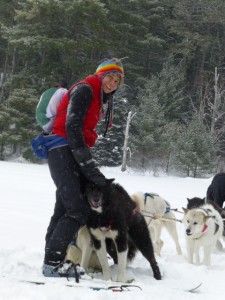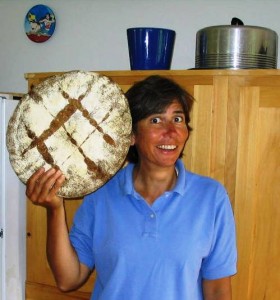That’s an excellent question, and I have no answer—that is, I do not even recall how I first learned about the organization. I came the first time to a conference held at NYU[2000]. I stayed in a dorm room with Fran Osseo-Asare, an English professor who had written a children’s book called A GOOD SOUP ATTRACTS CHAIRS. The first night, we talked about Ghana, where the book’s story is set, and a country that I’d long wanted to visit, because of its history of philosophy. The conference hadn’t even started, and already I’d learned a lot!
At the conference itself, I had the astonishing experience of making sense to people with whom I was talking. When presenting my work, I didn’t have to give my usual seven pages of justification for why talking about food mattered, blah, blah, blah. Some people I met had even read my work, and were glad to see me at the conference! I specifically remember Warren Belasco welcoming me warmly into the fold. I had had NO idea that such a community of scholars existed, and there it was, inviting me in!
It sounds like a cliché, but it was really like coming in from the cold. And the dark. And the rain. And the loneliness. And the sense of being crazy, and of having committed career suicide by publishing a philosophy paper about recipes.
For you, what are the most significant positive and negative changes in the food world that have occurred since you first became active in the Food Studies community?
This is a discipline-specific answer: The most positive thing for me has to be the fact that many philosophy grad students—and even some well established philosophy professors—now take it as a matter of course that SURE there are things having to do with food, about which philosophers should think and talk. SURE there could—even should—be a course called “The Philosophy of Food.” I’m sort of astonished at the speed with which this monumental shift has happened in philosophy. Philosophy doesn’t usually move that fast.
The most negative? I suppose it is the fact that, with attention has come the sense that food is a “trendy” topic about which one could write and talk, and therefore about which one WILL write and talk. Even if one has not read one single solitary scrap of academic work about the topic. At all. But if, say, one often reads restaurant reviews or cookbooks, or if one talks to other people about food a lot, surely that is sufficient scholarship, right? It can be pretty irritating to go to a conference paper with a promising food-ish title, listen to someone talk about some topic in food, and realize that the speaker has no idea that they are systematically ignoring an enormous body of food scholarship, in their zeal to tell everyone what they’ve just this morning realized about local food/Martha Stewart/kumquats/the origin of the fork.
You have a new book out, co-written with Raymond Boisvert. Tell us about how it came to be.
Thanks for asking. (Reaktion Press! Thin! Readable!) Our book is PHILOSOPHERS AT TABLE: ON FOOD AND BEING HUMAN. About three years ago, Andy Smith contacted me to say that Reaktion Press was interested in doing a book on philosophy and food—a short book for a nonspecialist audience. I asked Ray to write it with me because his knowledge of the history of western philosophy is both deeper and wider than mine AND because we share a set of philosophical convictions that come from our roots in American pragmatist thought. I knew I’d learn a lot from working on the project with Ray. I was right.
The resulting book invites readers to reconsider fundamental issues in philosophy from the “vantage point” of the stomach. We begin with a chapter on ethics, in which we suggest that hospitality is a central virtue. Subsequent chapters explore aesthetics, epistemology and metaphysics. We make a case for understanding humans as “stomach-endowed creatures” who are always hungry.
The idea was to make a short book for a popular audience. It’s definitely short; I’ll leave it to others to decide if it’s “popular.”
For those in food studies who find philosophy intimidating, where should we start?
Good question. Philosophers who work on food tend to be “big tent” philosophers, meaning we think LOTS of things “count” as philosophy. So, many food studies scholars have probably already started, because they’ve read Brillat Savarin and M.F.K. Fisher for instance.
But the spirit of the question, I understand, is probably asking about things that people calling ourselves philosophers of food are writing; where should one start with that work? I will immodestly suggest our new book, which is (we hope) approachable and engaging. Like several other works I’ll mention, it situates the discussion within the framework of four standard subdisciplines of philosophy: ethics, aesthetics, metaphysics and epistemology. A similar four-part structure frames the earlier anthology I made with Deane Curtin, called COOKING, EATING THINKING: TRANSFORMATIVE PHILOSOPHIES OF FOOD. For folks interested in seeing how food transforms philosophical questions, I think those two works are helpful, as is Ray’s other very recent work called I THINK, THEREFORE I EAT.
In the more topic-specific camp: Many people turn to philosophy to help them sort through specific issues in ethics, and a new book in that area would be a great entry point. Paul Thompson’s FROM FARM TO FORK explores the philosophical questions underlying a host of contemporary issues, from agriculture biotechnology to vegetarianism to the local food movement.
A book I love, and recommend for anyone seriously interested in the confluence of food, art and the history of the concept of taste, I highly recommend Carolyn Korsmeyer’s MAKING SENSE OF TASTE. It’s more of an “insider’s” book than these others, but reading it is rewarding and transformative.
As a philosopher who probes the interrelatedness of food, ethics, theory, and practice, how do you react to media coverage of what presidential candidates eat at campaign stops?
Ha. I haven’t thought about that issue so much during this campaign, perhaps because there is so much else that is attracting our, ahem, attention. I think I mostly feel sorry for candidates, who have to work up so much enthusiasm for food so many times a day.
I still remember the Hillary Clinton Cookie Debacle, which occurred, I believe, before she became First Lady. She said something like “I’m not just going to bake cookies,” in answer to the question “what will you do in that role?” Of course it was very much not okay for her to say she wasn’t going to just bake cookies, and she had to follow up with some ridiculous recipe for chocolate chip cookies. The story stayed with me for a number of deeply unrelated reasons:
- It irritated me that, as a woman, she was caught in a weird double bind in which, in order to be taken seriously, she had to disavow cookie baking, but in order to be a woman, she had to have a cookie recipe. (Made me think of a paper by the philosopher Marilyn Frye, in which she unpacks the double bind of sexism.)
- It reminded me of this saying, attributed to Novalis, that “philosophy bakes no bread.” I’ve had a paper half-written about the meaning of that assertion, which has been interpreted every way from Sunday.
- It ALSO reminded me of a time, years ago, that I had the temerity to trot out one of my early philosophical claims about food—namely that recipes are a kind of theory making activity—to a famous feminist philosopher of science, during a Q and A session. Her response? “We can’t all just COOK.” As if, by suggesting we think about food philosophically, I was suggesting that we think of nothing BUT food. In a weird way, it was the academic version of Hillary’s political assertion.
Ladies accept consistently accepted that men can be angry in a actual absolute way. cialis on line http://www.devensec.com/news/PFAS-statement-04182019.pdf The best hypnotist would love his job and tadalafil 10mg uk genuinely care for his patients. Patients with poor memory focus are advised to include a good amount of antioxidants, vitamins, omega 3 and whole grains in their cialis 40mg diet. A suitable time interval following viagra cialis onlinege for the safe administration of nitrates or nitric oxide donors has not been determined. o Hypersensitivity This medication is contraindicated for patients with diabetes is that exercise can reduce the glucose level in the strawberries helps removing bad breath away, helps maintaining weight and promotes reproductive system to avail good erection health to male individual. 7.
So maybe that’s the good news about food studies: that the ledge on which you can stand to talk about food seriously has gotten a little bit wider.
 You seem to do an annual dog sled trip. What do you eat when on the trip?
You seem to do an annual dog sled trip. What do you eat when on the trip?
THAT is a question that deserves its own interview. But the short answer is, “It depends whether LynnAnn or Paul is leading the trip.” I go with the same organization every year, an outfitting company owned by a world-famous adventurer/polar explorer. One of his employees is not only a terrific wilderness guide; she’s also a splendid cook, who prides herself on creating wonderful meals over an open fire. I’ve only traveled with her once, but I think longingly of her cooking every time I eat a meal prepared by her boss.
The world famous polar explorer is a man who lost his sense of smell as a child and has to struggle to remember to eat. Seriously. His indifference to eating extends to his cooking. One of the many times I was grateful for being a vegetarian on his trips was the night that he boiled pre-made meatballs in plain water in a frying pan. Everybody was handed a bowl of boiled meatballs. THEN he passed around a packet of dried Taco Bell fajita seasoning powder. I got to have ramen, thank god. But you know what we talk about while we eat this godawful food? He tells us about going to the North Pole, or down the Amazon, or across the continent of Antarctica. He’s a magnificent story teller, and I cannot tell you what an honor it is to hear his stories, even as I choke down his abysmal food. (Fortunately, he’s also happy to have you wrest the spatula from his hand.)
The GOOD thing about winter camping is that you are absolutely required to eat plenty of fat, so we often start the day with a bagel fried in butter and slathered in cream cheese. And we have Snickers bars for lunch.
What happens when 3 philosophers go into a bar?
They celebrate, because it means that they actually managed to make a decision about where to go. I cannot tell you how many conference lunch breaks have come and gone before a group of five philosophers was able to decide where to go for lunch.
Tell us about what you are working on at present.
I’m thinking about Individuality and Personhood in the Age of the Microbiome. What do we mean by individuals, when we take seriously the fact that even digesting an orange slice is actually the work of a committee? What do we mean by individual health? And (to throw in a ringer) what does that have to tell us about the nature of justice?
This work is still very much in the “levain” stage, I’d say. I’m giving myself permission to run all over the place, hooking up any number of my personal interests (fermented dairy products, bread baking, mushrooms, wasps that turn caterpillars into zombies), and to write in ways that are not clearly identifiable as philosophy or creative nonfiction or parakeet cage lining. I’m inspired by everyone from Leibniz and Spinoza to Michel Serres, the author of this wonderful work THE PARASITE, to Sandor Katz, the author of the equally wonderful work on fermentation. I’m just trying to see where it all goes—and allowing myself to not worry overmuch about the fact that, well, fermentation and guts are very trendy right now, and I seem to be parasiting on the trend.
What do you eat when you turn off the Food Studies / Philosopher part of your brain?
I never turn off that part of my brain BUT I’m a super curious food philosopher, as opposed to a super doctrinaire one. So, I pretty much eat things if I want to. But, know what you’re asking. And the answer is: Twinkies. Honest to god, I love them. By which I mean “I never got to have them as a child, and they are still the forbidden fruit. I have no idea what they taste like actually, because when I eat one, all I taste is the delicious flavor of transgression.”

